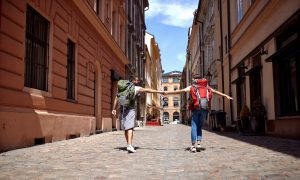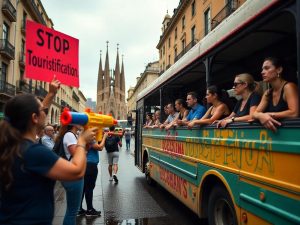A top U.S. Olympic official said he’s been given “significant reassurances” that President Donald Trump’s proposed travel restrictions won’t keep athletes from attending the 2028 Summer Games in Los Angeles.
U.S. Olympic and Paralympic Committee Chair Gene Sykes told reporters Thursday he and the Colorado Springs-based organization’s CEO, Sarah Hirshland, “were quite pleased to hear that support” during meetings last week with members of Congress and the administration.
What’s happening with another Trump initiative, an executive order barring transgender athletes from participating in women’s sports including at the Olympics, is not as clear, but it was “one of the key topics” during Wednesday’s closed-door USOPC board meeting, Sykes said.
The board, he said, discussed unspecified “feedback” from the U.S. State Department about the president’s “Keeping Men Out Of Women’s Sports” executive order signed in February that targets the Olympics.
“As a board, we reaffirmed our commitment to protecting opportunities for athletes to participate in sport. We will continue to collaborate with various stakeholders with oversight responsibilities,” Sykes said, “to ensure women have a fair and safe competitive environment.”
Citing a list of international and U.S. sports entities but not the government as stakeholders, he said the board “is dedicated to maintaining an open and ongoing dialog and we will actively engage on this topic as discussions evolve.”
Trump’s executive order spells out that the United States will “to the extent permitted by law,” prevent “males seeking to participate in women’s sports” from entering the country for competitions.
The order also calls on the secretary of state to “use all appropriate and available measures to see that the International Olympic Committee amends the standards governing Olympic sporting events” that let individual sports federations determine transgender athlete eligibility.
IOC President-elect Kirsty Coventry announced after her election last month the policy will be reviewed by a task force. She stopped short of agreeing with Trump but said she wants “the IOC to take a little bit more of a leading role.”
There appears to be progress made on easing the impact on the Los Angeles Games from upcoming travel restrictions set to be put in place due to security concerns that reportedly affect residents of as many as 43 countries.
“We had a wide range of discussions with parties in Washington, D.C. I would say we received tremendous support from the administration and members of Congress. There is great excitement and focus on the L.A. ’28 Games,” Sykes, who is also an IOC member, said.
That includes from the president, he added.
“It’s very clear that from the very top of the administration, they want this to an incredibly successful experience for all Americans and all of the athletes and visitors who come from, frankly, every country in the world,” Sykes said.
The nation’s leaders, he said, “understand what it means to host the Olympic Games. So we were provided with significant reassurances about the work they’re going to do with us to manage the visa process to make this work well for athletes and their appropriate entourages.”
That didn’t include the administration’s intent to bar transgender athletes from coming to compete, Sykes said.
“We didn’t discuss the issue,” he said. “Our general discussion on visas is to make sure that we have as much support from the administration, the State Department, as we can possibly receive. The reassurances have been very broad.”
Hirshland said Team USA has always enjoyed bipartisan support “and relationships in Washington remain very important,” with the U.S. hosting a pair of Olympics over the decade, the 2028 Summer Games in L.A. and the 2034 Winter Games in Utah.
She said the USOPC focused most on “shamelessly lobbying for the preservation of broad-based sport, and Olympic sport in particular, on college campuses” amid cost cutting resulting from schools paying athletes for the use of their name, image and likeness.




